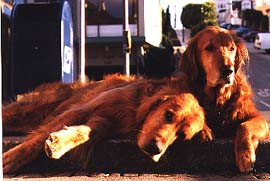What exactly is a “senior” dog?
……Answer: Veterinarians say that dogs start to fall into the category of “senior” around the age of 7. However, it depends on size. The smaller the dog, the later in life the dog becomes a senior. Nonetheless, a dog in a shelter can be as young as 5 and still have trouble finding a new home. Technically speaking, many of these dogs aren’t “seniors” in the veterinary sense of the term, but to many prospective adopters they are already “over the hill.” Of course, that isn’t true. Dogs, when well cared for and given appropriate care and exercise, remain happy, active, playful and puppy-like well into their senior years.
Won’t I be adopting someone else’s problems? If the dog were so wonderful, why isn’t he still with the original family?
……Answer: Older dogs lose their homes for many different reasons….most of them having nothing to do with problems the dog has, but rather with those of the person or family surrendering the dog. Many folks think dogs who end up at shelters or in rescue are all genetically and behaviorally inferior. But, it is not uncommon for very expensive, well-bred, well-trained dogs to outlive their usefulness or novelty with folks who bought them on impulse and no longer want to take responsibility for them.Other reasons older dogs become homeless: death of a guardian….not enough time for the dog…… change in work schedule….. new baby…..need to move to a place where dogs are not allowed…. kids going off to college…. allergies…. change in “lifestyle”…. prospective spouse doesn’t like dogs. (All these reasons are taken from real case histories.)

Ty, a stray, about 8 years old; and Jazzie, an owner-surrender, 9 years old –adopted in San Francisco through Norcal Golden Retriever Rescue (Photo by Charlene Campbell)
What advantages do older dogs have over puppies or young dogs?
……Answer: Older dogs who are offered for adoption by shelters or rescue agencies generally have had some training, both in obedience and house manners. (Some dogs, due to the confusion and upset of being uprooted and finding themselves in a chaotic shelter environment, may temporarily forget their housetraining. Inevitably, once established in their new home, they remember.)
Older dogs have learned what “no” means and how to leave the furniture, carpets, shoes, and other “chewables” alone. (If they hadn’t learned that, they wouldn’t have gotten to be “older” dogs.)
They have been “socialized” and learned what it takes to be part of a “pack” and to get along with humans and, in most cases, other dogs, and in some other cases, cats, as well.
Older dogs, especially those who have once known it, appreciate love and attention and quickly learn what’s expected of them to gain and keep that love and attention.
Older dogs know how to let you finish the newspaper, sitting calmly next to you, while your workday stress flows away and your blood pressure lowers. They are also instant companions, ready for hiking, riding in the car, walking on leash, fetching, etc.
Finally, older dogs are a “known commodity.” They are easy to assess for temperament, and you also don’t have to guess how big they’ll grow or whether they’ll turn out to have serious behavior problems.
There must be something wrong with a rescue dog….what are some usual problems they present?
……. Answer: Notes from a column by Laura Cundiff, published in the Central Indiana Lab Rescue News, November 1998: “People often wonder why the dogs end up in rescue and ask what is ‘wrong’ with them. During my experience fostering Labs, I have come to realize that nothing is ‘wrong’ with the dogs, but instead with the people who give them up. Common excuses people use are that they don’t have enough time for the dogs or that they are moving (although I have never heard of any state in the U.S. where dogs are illegal). All of the dogs my sister Deb and I have sheltered have been loving, sweet, typical Labs. Most Labs that end up in rescue are housebroken and well-mannered, just looking for the chance to live in a loving, secure and stable home.“
Aside from any advantages an older dog has, is there any good reason to adopt an older dog instead of a puppy, who has his whole life ahead of him?
……Answer: Just about everyone who enters a shelter is looking for a puppy or a young dog (generally a year old or under). There are also many people who buy puppies from breeders or puppy mills (many are purchased online). By adopting an older dog, we can make a statement about compassion and the value of all life at all ages, as well as register a protest against the indiscriminate and inhumane breeding of dogs, whether it is for profit or to “teach the children about birth.” And, of course, just as a puppy has his whole life ahead of him, so does an older dog have the rest of his life in front of him. You can give that older dog the best years of his life while at the same time bringing a wonderful addition into your family. Another consideration is the larger goal of making the U.S. a “no-kill” nation. By setting the example of adopting a dog who would be otherwise euthanized just because of his age, you can help create the climate that will enable the U.S. to attain that goal.
Don’t older dogs cost more in vet bills?
…… Answer: Veterinary attention and medication are needed at all ages and might be more costly for an older dog. Before you adopt a senior, be sure you get a health report from a veterinarian. That way, if you discover that the dog has health issues, you can assess whether you are able to make the needed financial commitment before making an emotional commitment. Some rescues will cover the initial costs of dealing with health issues, and, at the very minimum, will already have done a health exam upon intake.
Do older dogs have any “special needs”?
…… Answer: With a health assessment of the dog, you will know whether any age-related conditions are present and you can take appropriate measures to address them. Otherwise, older dogs need all the things younger dogs do — good nutrition, exercise (although less intensive, usually, than for a younger dog), and regular visits to the vet.
Isn’t it true that you can’t train an older dog the way you can train a puppy?
……Answer: Dogs can be trained at any age. The old adage, “You can’t teach an old dog new tricks,” just isn’t true. A ten-year-old dog we know named “Autumn” was called “Stupid” by her original family for the first ten years of her life. She was adopted at the age of 10 by a caring person and at age 14 began winning awards for attaining first place in her obedience class.
How long will it take for an older dog to settle into a routine with me?
……Answer: Each dog is an individual and comes with a unique set of experiences and from varying circumstances, so it is hard to predict how long a specific dog will require to make an adjustment. If a dog has been in a shelter or kennel, the stresses of such an experience may cause him to be confused and disoriented for quite some time. Some dogs forget or are confused about their housetraining. With care, patience, and a kind, understanding, loving attitude, just about any dog will come around after a while. It may be a few days, a few weeks, or a few months. A good summary of how dogs settle in is contained in the 3-3-3 rule, which refers to 3 days, 3 weeks, and 3 months — and what to expect at those junctures.
Is there anything special I will need to do during the dog’s “adjustment” period?
……Answer: Again, this will depend on the individual dog. In general, with a dog of any age, it is a good idea to set aside a period of several weeks during which you can spend more time than usual in reassuring the dog, establishing good communication with the dog, and creating the special bond that will ensure a good future together.
What kind of help and support can I expect from the agency through which I adopt a senior dog?
……Answer: Agencies vary in the resources they have available. Some will guide you carefully through any adjustment period that may be needed; others just don’t have the staff or resources. A number offer to cover the costs of veterinary care for a period of time. If you feel you need assistance of any kind, check with the agency to see if it is provided.
I just lost my old dog. What if I lose another soon after I adopt him?
…. Answer: Grief is a very personal matter. Some people feel that giving a home to an older dog in need is a tribute to their former dog and actually eases their pain. Also, knowing that adoption has saved a dog from euthanasia and will allow her quality time for whatever period she has left, often enables people to focus on the positives and to deal better with loss. Consider also that there are never any guarantees about length of life with any dog. Quality of time together can matter a great deal more than quantity.
Testimonials from people who have adopted senior dogs….

“Adopting a senior dog has been one of the best things I have ever done. I’ve enjoyed so many of the advantages of an older dog — such as his being more settled and already housetrained. In no time at all, Petey and I had our routines established. I love coming home from a day at the office to see his little tail wiggling and a smile on his face because he’s so glad to see me. And, oh, he gives the BEST kisses.” — Lori Eaton, Marin City, CA
 “I never thought twice about adopting Mandi, even when I knew she was ten years old. I believe that older dogs deserve happiness and love and a good home as much as younger dogs. Love knows no age.” — Nadine Killion, Taunton, MA
“I never thought twice about adopting Mandi, even when I knew she was ten years old. I believe that older dogs deserve happiness and love and a good home as much as younger dogs. Love knows no age.” — Nadine Killion, Taunton, MA
 “The needy dogs and cats I’ve fostered and adopted do a lot more for me than I do for them. I love seniors in particular because they are calm and slow moving, like myself. We can go for walks without my feeling like a kite at the end of the leash.” — Sharon Burnett, Redding, CA
“The needy dogs and cats I’ve fostered and adopted do a lot more for me than I do for them. I love seniors in particular because they are calm and slow moving, like myself. We can go for walks without my feeling like a kite at the end of the leash.” — Sharon Burnett, Redding, CA
 “Many people criticized me for adopting such an old dog. I just told them. ‘Well, she doesn’t mind how old I am, so I don’t mind how old she is.’ I wouldn’t trade my time with Bearsie for the equivalent of our combined weight in perfect diamonds!” — Jenny Evans, Atlanta, GA
“Many people criticized me for adopting such an old dog. I just told them. ‘Well, she doesn’t mind how old I am, so I don’t mind how old she is.’ I wouldn’t trade my time with Bearsie for the equivalent of our combined weight in perfect diamonds!” — Jenny Evans, Atlanta, GA
What does it cost to care for a dog?
The ASPCA figures a dog’s annual cost at about $1,400 (October 2022). Rover.com factors in more variables and arrives at a wider range.
More on adoption of senior dogs….
Why don’t older dogs get adopted? — Notes from Dachshund Rescue — “The most sought after of all Dachshund rescues is the ‘two-year-old mini.’ As a result, there are very few of these animals in rescue for very long. And the wait for one can be substantial, often discouraging people from adopting a rescue at all. But why a ‘two year old mini’? Why not three years old, or one year old, or some other age? This seems to be a psychological thing, more than anything else. At two years old, it can be assumed that a dog will have a good, long time ahead of it. At one year of age, it’s ‘still a puppy,’ with all of the problems and difficulties that description brings to mind. At three years old, most people assume that the animal has fewer than 10 years left and don’t want to think of the heartbreak of losing it so quickly.
“The ultimate barrier is at age five. Once an animal turns five, it is nearly impossible to place quickly. And, if turned into a shelter, is almost certainly guaranteed a quick euthanization. Most shelters are so overcrowded, the only practical solution for them is to destroy the ‘unadoptable’ animals. How many animals were destroyed last year for the crime of being over five years old? Last month? Last week? Today? When was the last time you saw an animal in a shelter over three years old, for that matter?”
Kate Cowles wrote from Iowa City in May 1999: “My father (almost 81 years old with Parkinson’s) has been visiting us this week, and our Mickey (12-year-old Airedale mix) seems to have adopted him. Mickey has spent a lot of time just lying quietly near my dad. My dad has commented that Mickey seems to want to ‘hang out with another old duffer.’ This has been my first opportunity to see what a great combination older dogs and older people are.”
What are the health benefits to people of having a dog?
Studies have proven that petting a dog or cat lowers blood pressure. In addition, the studies have shown that patients who have access to pets recover faster from illness or surgery. — as published in the Medical Journal of Australia, Vol. 157, Section 7, 1992 “Pet Ownership and Risk Factors for Cardiovascular Disease.”
We would like to make the obvious point that an older dog, being calm and mellow, is the kind of dog who most enjoys lying quietly to be petted or to keep someone company while recovering from an illness or injury.
When Older Dogs Are the Best Adoption Choice
Mary Brownell, who does extensive work in dog rescue, noted on the Senior-L E-mail list: “There are many wonderful dogs needing rescue — not only the adorable puppies we all love to cuddle. Often overlooked (and euthanized as ‘unadoptable’) are older dogs, most of whom would be perfect for those who do not have the time to housetrain or the energy level necessary for a younger dog. The older rescue is ideal for a household with very young children: the dog’s temperament is known and housetraining and obedience lessons don’t have to be undertaken at the same time diapers need to be changed. … Some convalescent and nursing homes make arrangments for pets to come and live with their owners, knowing the therapeutic value and the sense of loss to both patient and pet when they are separated.”
Thanks to Lori Campbell for also posting to the Senior-L list a report from a nurse in Tennessee: “I had a patient last week who is in her eighties, suffers from several disorders and has lost most of her vision to macular degeneration. She had always had dogs until three years ago, when her last dog died and her husband strongly discouraged her getting another one due to their advancing age and her medical condition. She had a friend with four dogs who offered to take her to the vet as needed and to adopt the dog as her own, should the lady or her husband die. Still, the husband wouldn’t relent. Her physician overheard her talking about wanting a dog and he asked her why. She replied, ‘To love and go walking with.’ When I was preparing her discharge papers later that day, the following prescription was there along with others for various medications: ‘1 dog. To love and to go walking with.’ It was signed by her physician.”
You may also want to consult one of these books:
Choosing a Shelter Dog, by Bob Christiansen, published in 1995, Canine Learning Center.
Adoption Option: Choosing and Raising the Shelter Dog for You, by Eliza Rubenstein & Shari Kalina, published in 1996, Howell Books.
Save That Dog! by Liz Palika, published in 1997, Howell Books.
If you are planning to get a dog from a breed rescue organization, read the article “Purebreed Rescue Is a Source of Older Pets.“
There are different schools of thought when it comes to dog training. Some trainers believe in the use of verbal praise and other types of non-food rewards for training. The most current thinking, however, is that the use of a food-based reward system lends itself better to the concept of “positive reinforcement” and avoids the negative “correction” or “punishment” that is a component of some systems of training.
Some systems of training employ a choke collar. Please be aware that your dog can strangle himself on his choke collar. We have had reports of dogs left in their crates overnight whose choke collars got caught in the bars of the crate and would not release. The dogs slowly choked to death. Decide whether a choke collar really is necessary for your dog. Expert advice is to eliminate it, if at all possible.
In the past, dogs who were meant for high-level, competitive “obedience” work were trained using very harsh, punitive methods. Although these methods are not widely practiced today, there may still be a few stragglers around who believe in them. The Senior Dogs Project strongly advises against those training methods for any dog, but we particularly recommend against it in the case of an older dog. It is too stressful and totally inappropriate. It is far preferable to be as gentle as possible, while using positive rewards and being fair, understanding, and, above all, consistent.
Every dog is an individual. Some dogs are more highly motivated than others to please their human companions. Some will be much more sensitive than others to tone of voice or to the cues you use in giving praise. Dog owners are individuals, too, so you need to be aware of your own tendencies and preferences when it comes to training. The references listed below will help you decide what system suits you best.
Judy Moore’s “Dogs Deserve Dialogue” (no-punishment behavior modification for all “problem” dogs)
“Training Your Dog” by Cindy Tittle Moore
Perfect Paws
Pet Helpline
Helping the Abused Dog
Second Hand Dog by Lea Benjamin is also a recommended book.
Humane agencies and shelters offer courses in dog training at a nominal cost. Be sure to check those in your area for information.
Various types of training — e.g., “obedience” or “agility” — that you do with your senior dog can be a wonderful way to spend quality time together. Your senior will thrive on the attention and extra time you’ll spend together. Even if your older dog can’t run as well or see as well as a younger dog, he can still make progress in obedience and agility training. It’s not necessary to “show” in competition. The experience, in and of itself, will be enjoyable and enriching for both of you.
